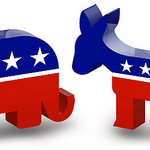“…Governments are instituted among Men, deriving their just powers from the consent of the governed…”
“We the people of the United States … do ordain and establish this Constitution for the United States of America.”
“…that government of the people, by the people, for the people, shall not perish from the earth.”
The through-line connecting the Declaration of Independence, the Constitution, and Lincoln’s Gettysburg Address is the still-radical notion that legitimacy in government rests with the people. It is ingrained in our national psyche. It is also the only reason we can legitimately speak of this as a ‘democratic’ nation when only free, white, property-holding men could actually vote.
But that’s as far as democracy goes. It’s the best source of government legitimacy but not a guarantee of better policy outcomes. Precisely because the Federalists understood how precarious democracy was as a policy-making enterprise, they crafted a Constitution intended to take advantage of its strengths while minimizing its weaknesses.
Separate branches were designed to turn personal or factional interests into a catalyst for good decision making. A tiered Congress, the federal-state divide, and an unelected judiciary were each designed to make it difficult for a single popular faction to dictate their will to a minority. The Bill of Rights helped assure those opposed to the Constitution that their rights would be protected in the new system, a crucial element of trust necessary for a democratic system to work.*
Those crafting the Constitution didn’t get the system exactly right – most consequentially their “compromises” on slavery almost doomed their experiment to failure. But they did surprisingly well, especially considering that they were the first to try putting this belief into practice. Of course, a great deal of credit for saving us from the disaster of slavery and creating what we have today belongs to Lincoln and the champions of the 13th, 14th, and 15th amendments.
All of this is to say that – like those who crafted our government – I regard the citizenry as neither idiots nor saints. Some get involved, some pay a great deal of attention to politics, and most are poorly informed (if at all). But that’s their right. We get to govern ourselves. If we do poorly, we’re stuck with the consequences.
* Though the authors here rejected the recently proposed campaign finance amendment, I expect that we are probably due for a new set of amendments to settle some political disputes.
Latest posts by Jason LaBau (see all)
- Take Down the Confederate Monuments - August 14, 2017
- The Democratic Split - August 10, 2015
- On Lincoln and Our Second Founding - July 6, 2015

